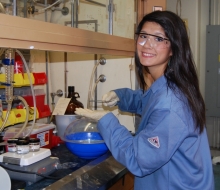
Major:
University:
Mentor(s):
Faculty Sponsor(s):
Faculty Sponsor's Department(s):
Project Title:
Project Description:
Solar cells are a potential renewable energy source; however the current cost per watt for energy produced by solar cells, due to processing and materials, is too high. Polymer-based solar cells (PSC) hold the potential of overcoming both of these barriers due to lower material costs and their ability to be solution-processable. The common PSCs active matrix is a blend of a semi-conducting polymer and a soluble fullerene derivative, known as a bulk hetero-junction (BHJ). It has been shown that thermal annealing after fabrication improves performance of P3HT:PCBM based devices. We investigated how thermal annealing affects the distribution of the components of these molecules throughout the film. To investigate the composition of the film, a depth-profiling technique, dynamic secondary ion mass spectrometry (DSIMS), was used. We examined the diffusion of P3HT into PCBM after annealing for 4 days at 130°C. Diffusion observed was slow, which is expected due to the large size of the macromolecule. When the same experiment was performed with PCBM into P3HT we saw much more diffusion occur. Our hypothesis for this significant difference between diffusion characteristics was due to the small size of the PCBM molecule as well as potential solvent retention in PCBM films, which would enhance its molecular mobility. This will be examined using Fourier transform infrared spectroscopy (FT-IR) attenuated total reflectance (ATR). Further investigation into the effects of thermal annealing on PSC devices utilizing DSIMS is ongoing. This information will provide insight on processing-morphology relationships and help aid in the design of future PSC devices.
